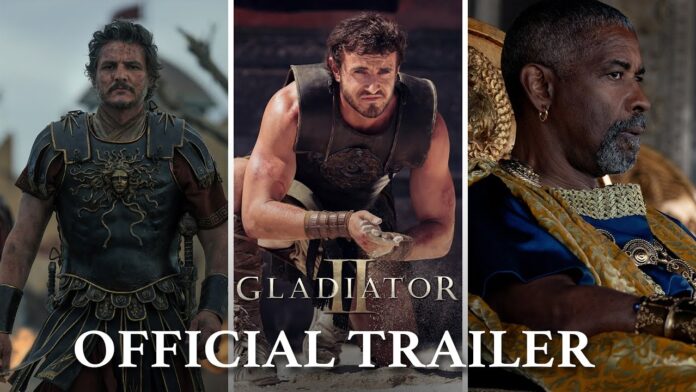Ridley Scott’s sequel features intense gladiatorial combat, wild animal encounters, and Denzel Washington in a supporting role
The trailer for Ridley Scott’s highly anticipated sequel to “Gladiator” has dropped, offering fans a glimpse into the epic and brutal world of ancient Rome. Paul Mescal stars as Lucius, the nephew of the corrupt former Emperor Commodus and grandson of Marcus Aurelius. Despite his noble lineage, Lucius finds himself fighting for survival in the Colosseum as a gladiator.
The trailer opens with Lucius reminiscing about his childhood, recalling the day the former Roman commander Maximus took revenge on Commodus. This sets the stage for a new chapter of intense battles and personal vendettas. In a particularly gripping scene, Lucius faces off against a ferocious rhino, highlighting the high stakes and brutal nature of gladiatorial combat.
Lucius’s journey from a high-status individual to a prisoner and gladiator is central to the film’s plot. He becomes a fighter under the sponsorship of Macrinus, played by Denzel Washington. Macrinus, much like Oliver Reed’s character Proximo in the original film, plays a crucial role in shaping Lucius’s fate. Lucius’s mother, Lucilla, portrayed once again by Connie Nielsen, watches her son’s struggles with horror and concern, adding an emotional depth to the narrative.
The film also introduces twin emperors, played by Joseph Quinn and Fred Hechinger, who seem to be as corrupt and ruthless as Commodus. Their demonic laughter during gladiatorial battles underscores the cruelty and decadence of Rome’s rulers. Pedro Pascal’s character, Roman general Marcus Acacius, adds another layer of complexity, as his true motives and moral stance remain unclear.
As Lucius fights for his life and honour, he receives a ring that once belonged to Maximus, symbolizing the connection to the past and the continuation of a legacy of resistance against tyranny. The trailer culminates in an intense showdown between Lucius and Marcus Acacius, with the gladiator seemingly having the upper hand.
Initial reactions to the trailer have been mixed. Some fans are excited about the high-octane sequences and the return of the gladiatorial spectacle, while others are sceptical about the film’s ability to match the original’s impact. The choice of soundtrack, featuring “No Church in the Wild” by Jay-Z and Kanye West, has also sparked debate, with opinions divided on its suitability for the film’s tone.
Analysis:
Political: The sequel to “Gladiator” comes at a time when themes of resistance against corrupt leadership are highly relevant. Lucius’s struggle against the twin emperors mirrors contemporary political struggles against authoritarian regimes and corrupt politicians. The film’s portrayal of the corrupt and decadent Roman rulers can be seen as a commentary on modern political elites who prioritize their own power and wealth over the well-being of the people. The character of Macrinus, who sponsors gladiators, can be interpreted as a figure representing powerful interests that manipulate and exploit individuals for their own gain, reflecting the complex relationships between politicians and influential backers in today’s political landscape.
Social: “Gladiator II” also resonates with ongoing societal debates about power, privilege, and justice. Lucius’s fall from a position of privilege to a gladiator fighting for his life challenges the notion of inherent superiority based on birthright. It underscores the idea that true honour and strength come from one’s actions and character, rather than social status. The film’s depiction of gladiatorial combat as a form of public spectacle draws parallels to contemporary issues related to the media and entertainment industries, where people’s struggles and suffering are often commodified for public consumption. This raises questions about the ethics of such practices and the societal fascination with violence and drama.
Racial: While the trailer does not explicitly address racial themes, the casting of Denzel Washington as Macrinus introduces an element of racial diversity that was not present in the original film. Washington’s role as a powerful figure who influences the fate of the protagonist adds a layer of complexity to the narrative. This casting choice can be seen as a reflection of the ongoing efforts in the film industry to provide more diverse and inclusive representation. It also highlights the importance of acknowledging the contributions and significance of individuals from different racial backgrounds in historical and epic narratives.
Gender: Connie Nielsen’s return as Lucilla provides continuity from the original film, and her role as Lucius’s mother adds emotional depth to the story. However, the film’s focus on male characters and their battles raises questions about the representation of women in historical and epic films. The trailer suggests that Lucilla’s primary role is to witness and react to the events unfolding around her, which may limit the portrayal of strong, independent female characters. This highlights a broader issue in the film industry, where women’s roles are often secondary to those of men, particularly in action and historical genres. The film’s success in addressing gender dynamics will depend on how it develops and portrays Lucilla’s character and other female roles.
Economical: The production of “Gladiator II” is a significant economic undertaking, reflecting the substantial financial investments required for epic historical films. The original “Gladiator” was a commercial success, and the sequel is likely to attract a large audience, driven by the legacy of the first film and the star power of actors like Paul Mescal, Denzel Washington, and Pedro Pascal. The film’s release will also have economic implications for the film industry, potentially boosting ticket sales, merchandise, and related media. However, the film’s portrayal of the exploitation and commodification of gladiators raises questions about the ethical implications of profit-driven entertainment, both in ancient Rome and in the modern film industry. This parallels contemporary concerns about the commercialization of sports, reality TV, and other forms of entertainment where individuals’ struggles and achievements are monetized for public consumption.
